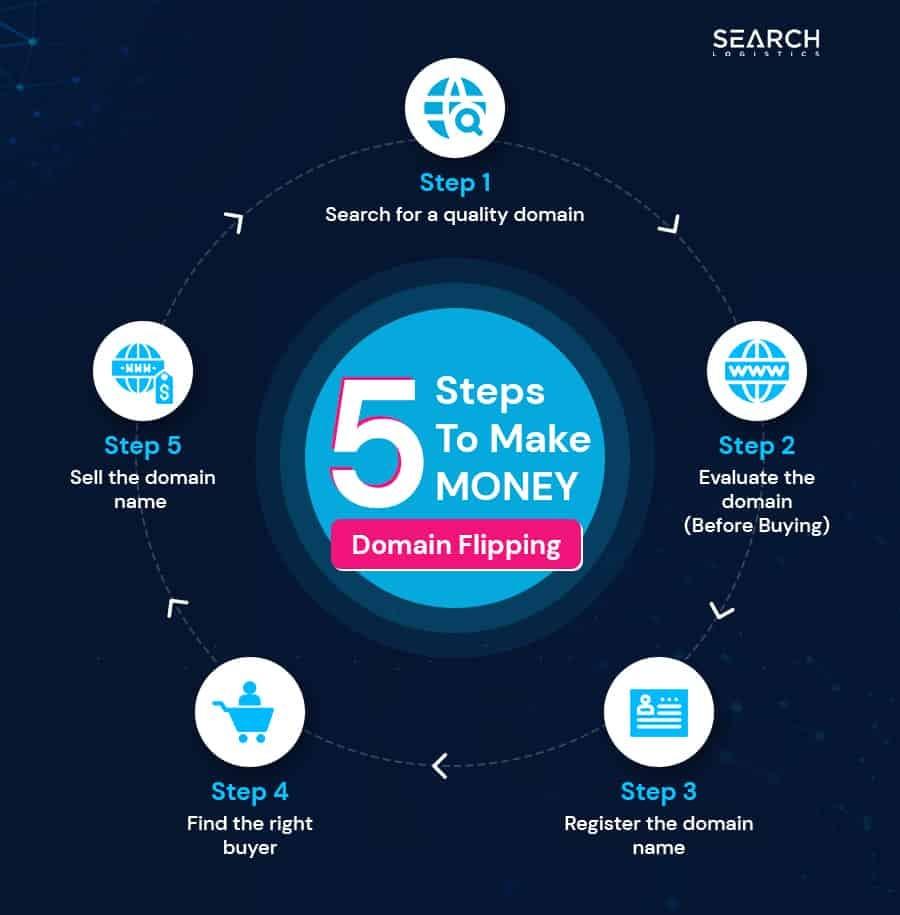Table of Contents
- Understanding the Domain Flipping Market and Its Potential
- Identifying Profitable Domains: Key Factors to Consider
- Effective Strategies for Acquiring Undervalued Domains
- Marketing Your Domains for Maximum Profitability
- Common Pitfalls in Domain Flipping and How to Avoid Them
- Q&A
- Key Takeaways


Understanding the Domain Flipping Market and Its Potential
The domain flipping market has emerged as a lucrative opportunity for entrepreneurs and investors alike. Essentially, this practice involves purchasing domain names at a lower price and selling them at a premium. Key factors contributing to the success of this market include the growth of online businesses, the increasing demand for brandable domains, and the importance of having a strong online presence. Many individuals have transformed modest investments into significant profits by strategically buying and selling domains.
To navigate the domain flipping landscape effectively, it’s essential to understand the factors that can influence a domain’s value. Some of these factors include:
- Length: Shorter domains typically command higher prices.
- Keywords: Domains containing popular or trending keywords usually attract more buyers.
- Extension: Specific extensions like .com or .org are often more desirable than others.
- Brandability: A catchy name that is easy to remember can significantly increase value.
As demand increases, so does the potential for profit. Investors can utilize various methods to find valuable domain names. Here are a few techniques:
| Method | Description |
|---|---|
| Keyword Research | Identify trending keywords using tools like Google Trends. |
| Expired Domain Listings | Check sites offering expired domains that can be acquired for a low cost. |
| Marketplaces | Explore marketplaces where domain sellers list their domains for sale. |
| Networking | Connect with other domainers for insights and potential deals. |
Identifying Profitable Domains: Key Factors to Consider
When diving into the domain flipping business, recognizing the elements that contribute to a domain’s profitability is crucial. One of the most vital factors to consider is keyword relevance. Domains that contain specific keywords relevant to a popular niche tend to have higher search traffic potential. Conduct thorough keyword research using tools like Google Keyword Planner or SEMrush to identify terms with high search volume and lower competition. This will not only help in choosing a profitable domain but also enhance its visibility when it comes time to sell.
Another key factor is domain length and ease of remembering. Shorter domains that are easy to spell and pronounce are generally more valuable. They tend to have higher brandability and are easier for users to recall, which can translate to direct traffic. In contrast, domains that are long, complicated, or contain unusual spellings might deter potential visitors. When considering a domain, aim for one that is concise and clear, ideally 15 characters or fewer. Additionally, check the availability of corresponding social media handles, as this can increase the domain’s appeal when reselling.
the domain extension (TLD) plays a significant role in determining a domain’s value. While .com domains are often considered the gold standard due to widespread recognition and credibility, other extensions like .net, .org, and new niche-specific TLDs can also hold value depending on the market and target audience. Assess the potential market demand for various TLDs and how they align with your chosen niche. A domain with the right mix of relevance, length, and extension can significantly enhance your flipping success.


Effective Strategies for Acquiring Undervalued Domains
Acquiring undervalued domains can be a lucrative venture when executed with the right strategies. One effective approach is to utilize domain auction platforms, where you can find domains that have already garnered interest but haven’t yet reached their full value. Websites like Sedo and NameJet offer a wide range of options, often including expired or expiring domains at competitive prices. Keeping an eye on these auctions can lead to amazing opportunities to secure domains that could potentially yield high returns.
Another powerful tactic is to leverage keyword research tools to identify trending or niche-specific terms that might have available domains. By focusing on long-tail keywords, you increase your chances of finding lucrative opportunities that others might overlook. Tools like Google Keyword Planner and Ahrefs can provide insights into search volume and competition, enabling you to target less saturated markets. Once you’ve identified potential keywords, perform searches to find corresponding domains that fit the criteria.
Networking within online communities and forums dedicated to domain investing can also lead to valuable domain acquisition opportunities. Engage with fellow domain flippers through platforms like Reddit, DomainSherpa, or specialized Facebook groups. Many members share insights, tips, and even post domains for sale before listing them on auction sites. This form of collaboration can provide a competitive edge and may help you find undervalued gems that aren’t widely advertised.


Marketing Your Domains for Maximum Profitability
When it comes to maximizing the profitability of your domain investments, strategic marketing is key. First, ensure that your domains are listed on reputable marketplaces where potential buyers often browse. Websites like GoDaddy Auctions, Flippa, and Sedo are excellent platforms to showcase your assets. Optimize your listings with well-researched keywords and detailed descriptions that highlight the unique value of each domain. This will improve visibility and attract more targeted traffic to your offerings.
Consider leveraging social media to promote your domains effectively. Create engaging content on platforms like Twitter, Facebook, and Instagram to reach a wider audience. By sharing success stories of other domain flippers or posting tips about domain investment, you can establish yourself as an authority in the field. Additionally, participating in forums and communities like DNForum or Reddit’s domain-related threads can help you connect with other investors and potential buyers while enhancing your visibility.
Lastly, don’t underestimate the value of professional branding in your marketing efforts. A well-designed landing page can make a significant difference in how potential buyers perceive your domains. Incorporate elements such as:
- High-quality visuals: Use graphics and layouts that reflect the essence of the domains you’re selling.
- Testimonials: Showcase feedback from past clients to build trust.
- Calls to action: Encourage visitors to make inquiries or offers easily.
This cohesive approach not only enhances your credibility but also increases the likelihood of closing sales at a premium price.


Common Pitfalls in Domain Flipping and How to Avoid Them
One of the major challenges faced by those involved in the domain flipping business is the lack of thorough research before making a purchase. Many newcomers often rush into buying domains that appear appealing based solely on their price or a catchy name. It’s crucial to conduct proper due diligence, which includes analyzing the domain’s SEO history, backlink profile, and previous ownership. Without this foundational knowledge, you might end up with a domain that provides little to no value or worse, has been penalized by search engines.
Another common pitfall is overestimating the market demand for certain domain names. Flippers sometimes develop an emotional attachment to their selections, leading them to inflate their perceived value based on personal preference rather than market trends. To avoid this trap, consider utilizing tools such as Google’s keyword planner and domain appraisal services to better gauge the market interest. Making decisions based on data rather than emotions can significantly enhance your chances of a profitable flip.
Lastly, neglecting the importance of effective marketing and sales strategies can severely impact the success of your domain flipping endeavors. It’s not enough to simply acquire a domain; you must also be prepared to market it effectively. This includes creating attractive listings and optimizing them for search engines. Utilizing social media platforms and domain marketplaces can greatly enhance visibility. Here’s a brief overview of marketing strategies that could yield positive results:
| Strategy | Description |
|---|---|
| SEO Optimization | Enhance visibility of listings by utilizing relevant keywords. |
| Social Media Marketing | Promote domains through posts, ads, and shares. |
| Email Outreach | Contact potential buyers directly to generate interest. |
| Join Domain Forums | Engage with fellow flippers and potential buyers. |
Q&A
Q&A About Domain Flipping: Is It Real?
Q: What is domain flipping? A: Domain flipping is the practice of buying internet domain names at a lower price and then reselling them for a profit. This can involve acquiring trendy, catchy, or high-potential domain names and holding onto them until the right buyer shows up.Q: How does one get started with domain flipping? A: To start flipping domains, you should first research domain marketplaces like GoDaddy, Namecheap, or Flippa. Look for domains that have potential value—these often include popular keywords, short lengths, or brandable names. After purchasing a domain, you can list it for sale or hold it for a better offer. It’s also pivotal to stay informed about market trends and emerging niches.
Q: Is domain flipping a legitimate way to make money? A: Yes, domain flipping can be a legitimate way to make money, but it requires knowledge, strategy, and a bit of luck. Many successful domain flippers have turned it into a profitable venture, while others may struggle if they lack experience or understanding of market demand.
Q: How much can I expect to earn from domain flipping? A: Earnings from domain flipping can vary widely. Some domains may sell for only a few dollars, while others can fetch thousands or even millions if they are particularly desirable or unique. Your profits will largely depend on factors like the perceived value of the domain and your negotiation skills.
Q: Are there risks involved in domain flipping? A: Like any investment, domain flipping carries risks. The main risk is that a domain you purchase may not sell or lose its perceived value over time. Additionally, some buyers may engage in deceptive practices or scams. It’s vital to conduct due diligence and ensure you are purchasing and trading in legitimate domains.
Q: What tips can you offer for successful domain flipping? A: Here are some helpful tips for successful domain flipping:
- Research: Stay up to date on trends and keywords that may become popular.
- Focus on Quality: Buy high-quality, catchy domains rather than trying to flip anything you can find.
- Be Patient: Sometimes, it may take time to find the right buyer.
- Use Multiple Platforms: List your domains on various marketplaces to increase exposure.
- Network: Engage with other flippers and potential buyers to create valuable connections.
Q: Can beginners succeed in this field? A: Absolutely! While there is a learning curve, beginners can succeed in domain flipping by starting small, learning from their experiences, and progressively leveraging their gains into more valuable purchases. Education, persistence, and a willingness to learn will go a long way in this business.
Q: What tools can assist in domain flipping? A: There are several tools that can assist in domain flipping:
- Domain Search Tools: Platforms like NameBio or expired domain listings can help identify valuable domains.
- Valuation Tools: Use services like Estibot or GoDaddy’s domain valuation tool to gauge potential worth.
- SEO Tools: Tools like SEMrush and Ahrefs can help analyze keywords and competition for your domain choices.
With the right approach, domain flipping can be an exciting and profitable venture. Whether you’re looking to turn a hobby into a side income or dive deep into the domain market, knowledge and strategic planning are your best allies.

